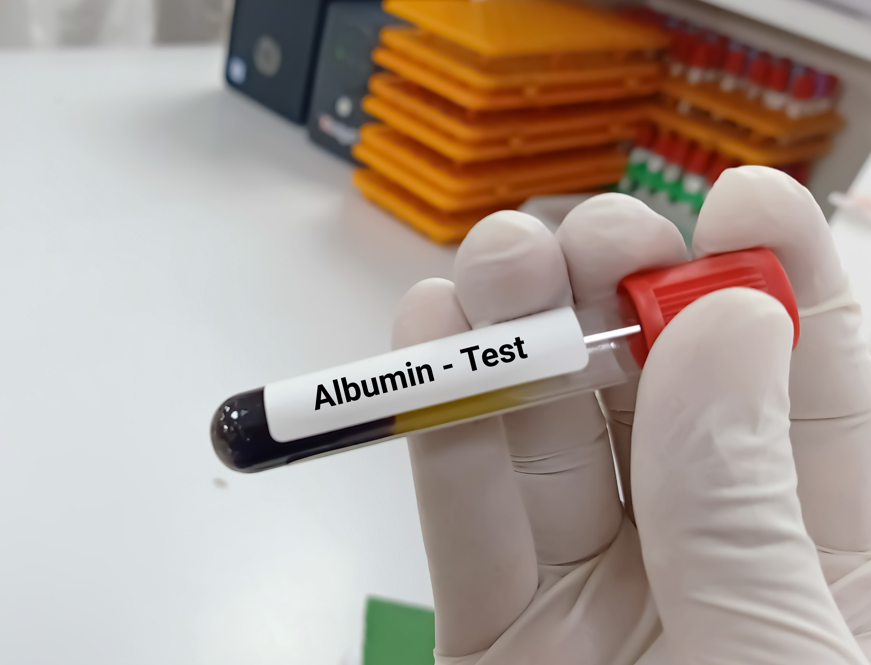
Also referred to as hyperalbuminemia, elevated albumin levels can indicate a severe, chronic dehydration or other health problems. The human body has proteins that form the building blocks and both albumin and globulin are important proteins essential for the body to function. Albumin comprises 50 percent of the plasma proteins in an individual’s body. This protein performs important function of controlling the colloidal osmotic pressure in the body. It helps to move fatty acids, bilirubin, hormones, cations, as well as drugs in a person’s blood. Albumin prevents the fluid in the blood vessels from leaking out into the tissues. If the concentration of albumin in blood plasma is lower or higher than it should be, it can indicate problems with the body. When the levels of albumin are lower than normal, it is referred to as hypoalbuminemia.
Table of Contents
What is a Blood Albumin Test?
Albumin is made in the liver and people need to have it in proper balance to help keep fluids within the blood vessels from leaking out. Albumin gives the body the proteins needed to grow and repair tissue. Albumin test is done to measure the levels of albumin in blood plasma.
Albumin tests can help in the diagnosis and evaluation of the kidneys and liver conditions. When the kidneys don’t function properly, albumin can leak into the urine and this causes a person to have low concentrations of the protein in their blood.
An albumin test is used to evaluate a patient if they are suspected to have kidney or liver disease. The patients may have symptoms like fever, tiredness, yellowish skin or jaundice, weight loss, tenderness below the right ribs, dark urine and pale stool, and pain in the right ribs and stomach area. People on dialysis may also need albumin tests to find out how well they are responding to the treatment.

Normal Albumin Levels
Typically, the usual levels of albumin in bloodstream are between 3.4 and 5.4 g/dL. This is the reference range for the concentrations of albumin in blood. The normal reference range for concentration of albumin in urine is about 0 to 8mg/dL. Albumin test is conducted during a liver panel and usually is done to diagnose liver diseases. There are other tests that may come along with albumin tests and they include blood urea nitrogen (BUN) test and creatinine test. A serum albumin test is ordered in individuals who show symptoms like explained weight loss, fatigue, and jaundice or swelling around eyes, abdomen, and legs.
Low Albumin Levels
When a person has low albumin levels, it could indicate a liver disease, shock, inflammation, or malnutrition. It may also indicate a kidney disease that causes damage to the glomeruli. A person may have hypoalbuminemia when the body is unable to absorb and breakdown proteins because of inflammatory bowel disease. Diseases such as nephritic syndrome, cirrhosis, liver dysfunction, crohn’s disease, overhydration or excessive thirst cause low levels of albumin in blood. Infection or inflammation, hepatic failure, and severe burn injuries also cause reduced concentration of albumin in blood.
High Albumin Levels – Causes
Having high concentrations of albumin protein in blood plasma is because of dehydration. It could also occur because of health conditions of the body. Dehydration occurs when a person doesn’t take sufficient amount of water or when they lose a lot of water from diarrhea and vomiting. Serum albumin can increase if a person has a disease that results in dehydration. It is important to point out that dehydration itself doesn’t cause the elevation of albumin protein, what happens is that when the body loses a lot of water, it makes the blood to thicken. This in turn makes the blood component to be too much concentrated.
Hyper-albuminemia or high albumin levels may be linked to a condition like deficiency in vitamin A or taking a diet that is rich in protein. Conditions that limit the ability of the body to digest, breakdown, and absorb protein for example, inflammatory bowel disease can be culprit to having high serum protein levels. Stress from surgery or having a heart attack may also be linked to high albumin levels. Acute infections and burns are also associated with increased levels of serum albumin.
Elevated albumin in blood may be caused by conditions and diseases like:
- Multiple myeloma
- Bone marrow disorder
- Chronic inflammatory conditions
Amyloidosis - HIV/AIDS
- Monoclonal gammopathy
Hydration is likely to result in a false elevation in albumin levels, so it is advisable you increase the intake of fluids. High albumin levels should prompt a doctor to consider examining a patient of diseases and conditions that cause reduced breakdown and absorption of protein, as well as dehydration or vomiting and excessive sweating. Treatment to correct high levels of albumin depends on what is causing the problem.
If an inflammatory bowel disease is suspected, a patient may be given medications like amino-salicylates, corticosteroids, antibiotics, immune modifying agents, or biologic agents like anti-tumor necrosis factor (TNF) agent. Bone marrow disorder causing elevated serum albumin can be treated using iron as well as folic acid supplements. Use of growth factor drugs like Epoetin Alfa (Procrit) can help to stimulate the production of blood cells in the bone marrow.
Authoritative Clinical References
https://www.ncbi.nlm.nih.gov/books/NBK459198/




Be the first to comment